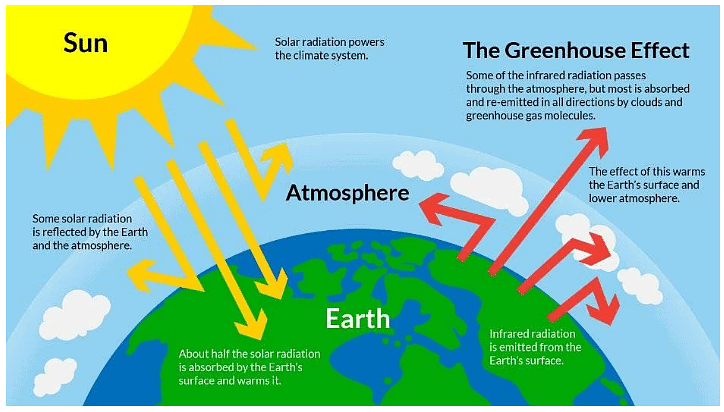Class 10 Exam > Class 10 Notes > Chemistry for GCSE/IGCSE > Greenhouse Gases
Greenhouse Gases | Chemistry for GCSE/IGCSE - Class 10 PDF Download
Effects of Greenhouse Gases
- The Sun emits energy in the form of radiation that enters the Earth's atmosphere
- Some thermal energy is reflected from the Earth's surface
- Most thermal energy is absorbed and re-emitted back from the Earth's surface
- The energy passes through the atmosphere where some thermal energy passes straight through and is emitted into space
- But some thermal energy is absorbed by greenhouse gases such as carbon dioxide and methane and is re-emitted in all directions
- This reduces the thermal energy lost into space and traps it within the Earth's atmosphere, keeping the Earth warm
- This process is known as the greenhouse effect
- As the concentration of greenhouse gases in the atmosphere increases due to human activity, more thermal energy is trapped within the Earth's atmosphere causing the Earth's average temperature to rise (global warming)
- This process is called the enhanced greenhouse effect
- Diagram showing how the greenhouse effect occurs:

Question for Greenhouse GasesTry yourself: What is the process called when thermal energy is trapped within the Earth's atmosphere by greenhouse gases?View Solution
Consequences of Global Warming
Global warming leads to various detrimental effects:
- Climate Change: The Earth's temperature rises, causing widespread climate fluctuations.
- Rising Water Levels: Melting glaciers elevate water levels, resulting in floods in low-lying regions.
- Species Extinction: Destruction of habitats leads to the extinction of various species.
- Species Migration: Animals shift to more hospitable areas to escape adverse conditions.
- Spread of Diseases: Warmer climates facilitate the spread of diseases.
- Habitat Loss: Changing climates threaten habitats of various species.
Question for Greenhouse GasesTry yourself: What is one of the consequences of global warming?View Solution
The document Greenhouse Gases | Chemistry for GCSE/IGCSE - Class 10 is a part of the Class 10 Course Chemistry for GCSE/IGCSE.
All you need of Class 10 at this link: Class 10
|
72 videos|162 docs|61 tests
|
FAQs on Greenhouse Gases - Chemistry for GCSE/IGCSE - Class 10
| 1. What are the most common greenhouse gases responsible for global warming? |  |
Ans. The most common greenhouse gases responsible for global warming are carbon dioxide, methane, nitrous oxide, and fluorinated gases.
| 2. How do greenhouse gases contribute to the greenhouse effect? |  |
Ans. Greenhouse gases trap heat in the Earth's atmosphere, preventing it from escaping into space, which leads to the warming of the planet.
| 3. What are the potential consequences of increased levels of greenhouse gases in the atmosphere? |  |
Ans. Increased levels of greenhouse gases can lead to rising global temperatures, sea level rise, more frequent and severe weather events, and disruptions to ecosystems and wildlife.
| 4. How do human activities contribute to the increase in greenhouse gas emissions? |  |
Ans. Human activities such as burning fossil fuels, deforestation, agriculture, and industrial processes release greenhouse gases into the atmosphere, contributing to the increase in emissions.
| 5. What are some ways to reduce greenhouse gas emissions and mitigate the effects of global warming? |  |
Ans. Some ways to reduce greenhouse gas emissions include transitioning to renewable energy sources, increasing energy efficiency, protecting forests, and promoting sustainable agriculture practices.
Related Searches















